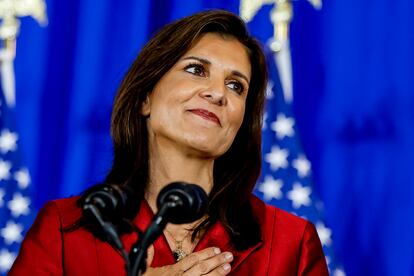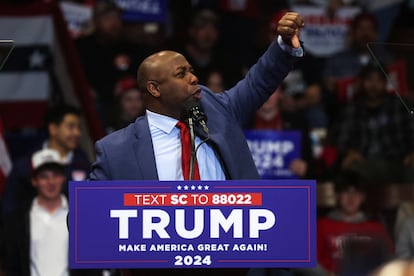Six keys to Trump’s decisive victory in the South Carolina Republican primary
The former president has nearly won the battle against Nikki Haley, who, after four consecutive defeats, is clinging to her 40% support to avoid throwing in the towel


Donald Trump scored another resounding victory on Saturday in his bid to win the Republican nomination, which he could secure as soon as 10 days from now, when 15 states take part in Super Tuesday. The former president defeated Nikki Haley in the primaries in South Carolina. Although South Carolina is Haley’s home state and voted for her twice as governor — a position she held between 2011 and 2017 with notable popularity ratings — the former U.N. ambassador still trailed behind Trump.
Haley lost by 20 points, despite a campaign in which she spared no effort or money. She does not plan, however, to throw in the towel just yet, and is clinging to the fact that 40% of voters supported her, more than what the polls predicted. Her argument is unchanged since she became Trump’s sole rival in the race, which began with 14 candidates. She is selling herself as the much-needed alternative for Republicans and independents who fear a second administration under Trump, who is charged with 91 alleged crimes in four different criminal cases.
But nothing and no one seems capable of stopping Trump’s advance among rank-and-file Republicans. If there are no major changes, the United States will see a repeat of the 2020 showdown between Biden and Trump at the presidential election on November 5.
1. Trump wins without breaking a sweat
Last Friday, Trump visited the quiet city of Rock Hill to give one of his difficult-to-explain rallies, in which his tide of disconnected statements and arguments, lies and half-truths was cheered on by thousands of his followers, who venerated him as if he were the messiah.
It was one of his few forays into South Carolina. Even though that was the state in which Haley appeared to have the best chances. It didn’t matter: he won with 60% of the votes without breaking a sweat. The former president seems to realize that he does not need to put in a lot of effort to win. The fact that lately he is spending nearly half his time in court is another factor.
Since his rise in the Republican Party in 2015 — a group that he has molded to his whims — Trump has shown that he has a huge influence on at least 30% of the electorate. It remains to be seen if his unprecedented way of campaigning will work when the fight is not just before his dedicated followers, and Democrats and independents also have a say. At the moment, the latest polls, give him a narrow lead over Biden. But given there are eight months to go until the election, it’s too early to give these polls too much credence.
2. ...and wins in all areas
Like a tennis player who can play on all fields, Trump has scored four consecutive and overwhelming victories in settings as distinct as the Iowa caucuses (a close vote, in a white and deeply religious Republican state); the more even-handed New Hampshire primaries and the caucus/primary combo in Nevada.
South Carolina was a whole new challenge. The state’s primaries, “the first in the South,” has two important factors in its favor: they almost never fail (since 1980, they have picked the winning Republican candidates on all but one occasion) and it is a place, although strongly Republican, it is more diverse than the other early-voting states. It is therefore usually considered a more reliable snapshot of what will happen in the general election.

3. But Haley isn’t dropping out of the race
Haley warned this much last Tuesday in an unusual press call: she is not planning on “going anywhere.” She said this to anticipate a defeat in her home state, where she went from town to town, holding rallies with small groups of voters united by their respect for Haley as governor and by the fear of a Trump return to the White House. On Saturday, she once again said that she will not withdraw from the race until at least Super Tuesday. Her critics have called on her to drop out, to save money and time. Among the most extreme Trump supporters, a conspiracy theory suggests that Haley’s donors are paying to divide the Republican Party and ensure that Biden wins in November. More serious experts suggest that she is staying in the race to take advantage of the national spotlight and establish herself as an option in the 2028 elections. It’s also possible that Haley wants to demonstrate that another Republican Party, that is more complete and moderate, is possible.
Haley justified her decision on Saturday, arguing that she is “a woman of her word.” “I’m not giving up this fight when a majority of Americans disapprove of both Donald Trump and Joe Biden,” said Haley, adding that she wanted to avoid a “Soviet-style election with only one candidate.”
4. The 40% who voted against Trump
After learning of her defeat, Haley gave a fiery speech in Charleston. “I’m an accountant. I know 40% is not 50%,” she said, pausing to let in the relieved laughter of her supporters, before continuing: “But I also know 40% is not some tiny group.” In other words, Haley not only sees herself as the only possible alternative to Trump, but also as the only Republican candidate capable of beating Biden in November, when voters may have to choose between a president with one of the lowest levels of popularity in history, and the man who plotted to subvert the results of the 2020 election, which led to the assault on the Capitol on January 6, 2021. The key to her speech, where at times she sounded like she was a third-party candidate, is that this 40% support, which she won in open primaries largely thanks to independent voters, is a sign of the problems that await the Republican Party if they opt for Trump.
5. Race to be Trump’s running mate
As Trump closes in on the Republican nomination, the bets are heating up as to who he may pick as his vice-presidential running mate. This weekend, it was Tim Scott’s turn to present his credentials to his home state. Scott, a Black senator from South Carolina, was one of the 14 Republican presidential hopefuls, but since he dropped out of the race — in which he faced Trump’s usual battery of insults and ridicule — the senator has become one of the biggest supporters of the former president. In his favor is the positive influence he may have on Black voters, who gave victory to Biden in 2020, but are now disappointed with the president, according to surveys.

Other possible names for the position are J. D. Vance, Ohio senator and best-selling author of Hillbilly Elegy; South Dakota Governor Kristi Noem, and Congresswoman Elise Stefanik. The three were part of a straw poll on Friday at the Conservative Action Political Conference (CPAC), which is held each year near Washington. It used to be a meeting of ideas about the future of the Republican Party, but has more recently become a summit of the most loyal Trumpists.
6. What's coming now
The next primary vote will take place on Tuesday in Michigan. Haley is already on her way to campaign in the state. Trump, for his part, has promised to cruise to another resounding victory with the support of the autoworkers unions, even though this group has already endorsed Biden. Indeed, all eyes will be on how the president performs in the Democrat primary in Michigan, and whether his support for Israel in the Gaza war will hurt him in the swing state, which has the largest Arab community in the country, which voted for him in 2020 and helped him cinch the victory.
A week later, there is Super Tuesday. On March 5, primaries are held throughout the country: 15 states will decide 874 of the 2,429 Republican delegates. To win the nomination, Trump needs — barring the withdrawal of his rival — 1,215 delegates. So far, he has 117, to Haley’s 17. It is also the date that usually decides who will be on the ballots of both parties.
Haley has not ruled out staying in the race after Super Tuesday, but for now she’s keeping her sights set on that date, where she will see how many states — or what percentage of them — support her. After that, the primary race will continue until the next big date of the Republican campaign: the Republican National Convention, which is set to take place in Milwaukee (Wisconsin) in mid-July. That’s when delegates from all over the country gather to vote for who they want to run for the White House.
Sign up for our weekly newsletter to get more English-language news coverage from EL PAÍS USA Edition
Tu suscripción se está usando en otro dispositivo
¿Quieres añadir otro usuario a tu suscripción?
Si continúas leyendo en este dispositivo, no se podrá leer en el otro.
FlechaTu suscripción se está usando en otro dispositivo y solo puedes acceder a EL PAÍS desde un dispositivo a la vez.
Si quieres compartir tu cuenta, cambia tu suscripción a la modalidad Premium, así podrás añadir otro usuario. Cada uno accederá con su propia cuenta de email, lo que os permitirá personalizar vuestra experiencia en EL PAÍS.
¿Tienes una suscripción de empresa? Accede aquí para contratar más cuentas.
En el caso de no saber quién está usando tu cuenta, te recomendamos cambiar tu contraseña aquí.
Si decides continuar compartiendo tu cuenta, este mensaje se mostrará en tu dispositivo y en el de la otra persona que está usando tu cuenta de forma indefinida, afectando a tu experiencia de lectura. Puedes consultar aquí los términos y condiciones de la suscripción digital.








































